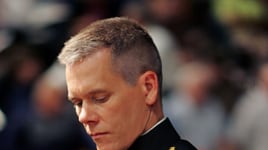
Kevin Bacon could have easily gone the typical dreamy, cheesy leading man route after he starred in Footloose 25 years ago. Instead, Bacon has carved an unexpectedly satisfying career for himself: Very few actors can play a pedophile ( The Woodsman), an astronaut ( Apollo 13), and a murderous river guide ( The River Wild) and make it all look believable.
In his new film, Taking Chance, Bacon plays a Lt. Col. Michael Strobl, a Marine who chronicled his journey escorting the body of a soldier who died in Iraq back to be buried in his hometown. The movie, which premieres on HBO this Saturday, February 21 at 8 p.m., depicts the level of detail and reverence the military uses when interring and bringing home its war dead, and the solemn and respectful reaction the ritual receives from everyday Americans who encounter it.
Bacon spoke to The Daily Beast about playing a few good soldiers, his upcoming Showtime series, going on tour with his band, The Bacon Brothers, and why he wants everyone to move on from Bernie Madoff.
What drew you to doing a film about bringing home the war dead?
Well, I guess all the care and the meticulous nature of the way that the remains are treated, and the rendering of the honors. I just didn’t know anything about it. You just kind of go well, OK, someone else died. And then what happens? And I think that a lot of what’s strong about the movie is that it puts that into our consciousness and lets us realize that there are human beings and families behind these statistics.
When did you first meet Colonel Strobl?
Oh, during my kind of rehearsal and research time. It’s a great opportunity, because it’s like my homework is halfway done for me. A lot of times, I have to kind of like create that stuff. I’ll have to build a character and build a biography and start to imagine how they might move, and might walk and talk, and where they might be from, what their friends might be like, what kind of music they might be into, you know, what kind of food they might like. And in this case, I got a chance just to go and hang out with Mike for a couple days, and then continued to email [with him].
You’ve played military men many times before ( A Few Good Men, Frost/Nixon), though.
I have. And certainly, the time that I spent at Quantico on A Few Good Men was very helpful. I think that there is something different about Marines. These are the guys who are willing to throw themselves in harm’s way. That’s the bottom line. They want to be the first in, and have a real kind of bond between each other. There’s like a true, true, deep, deep kind of brotherhood. And when you see them, and they look at each other, and they say, "Hey, Marine,” there’s an order and a ritualistic kind of tradition.
And I can tell you that for me, it’s so not in my DNA. There’s so much that I have to adjust to take that on, to be able to walk in that skin. I just go through the world in a different kind of way. I feel really strongly that with the military in general, when you have that haircut, and you’ve got that uniform on, people just sometimes have a hard time seeing past that, through the fact that you have a human being inside there, inside that uniform. And I think there’s a responsibility also to state, even though Mike is a Marine, there’s more to him than that.
“I feel really strongly that with the military in general, when you have that haircut, and you’ve got that uniform on, people just sometimes have a hard time seeing past that, through the fact that you have a human being inside there.”
To me, the most surprising thing about the movie was the amount of respect and reverence everyone had for the fallen soldier, Private Phelps.
I think that when you’re within a few feet of the remains of someone, you have a strong reaction to it. I can tell you that even when we were filming the movie, even though our box was empty, people would constantly react to what they were seeing being filmed. A lot of people would come up to me; people were crying, people would tell me about family members or friends who were over there. You know, it was almost like a sort of a little mini-version of Mike’s journey. And I don’t think that it’s necessarily because we haven’t seen it before, I think it’s just his view.
Do you wish the Bush administration had been more transparent about the mounting death count?
Oh yeah, I do. I certainly do. And I think that maybe we’re sort of coming around to that now. The Marines, and the military in general, have been very supportive of the movie.
Since starring in Footloose, you’ve had an extremely varied career—do you have a particular philosophy or method to selecting your roles?
I wish I had one. Honestly, I just kind of go job to job. I don’t have any kind of big, overall game plan. The only thing I’d say is that I’m always kind of trying to do something new and try something different.
You know, certainly when I became an actor, the idea of sort of playing the same thing every time, that was the last thing in the world that I wanted to do. To me, that would be the opposite of what an actor was, or at least the opposite of what drew me to it, which was to become different people, to walk in as many different sets of shoes as I possibly could. So if you’re going to be a Marine, or a child molester, or you know, a hooker, or a hairdresser, a cowboy, or an astronaut, that’s what it’s all about. I also think that as a creative person you have to take risks. You gotta push the envelope sometimes, even if it’s just for yourself.
So how do you think you managed to avoid that heartthrob stereotype?
I guess because I knew that I didn’t want to just do that, that one thing. And I knew that partly because when that movie came out, I was 24 or something like that. I’d been making movies already since I was like 18 or 19. It wasn’t like I went from zero to 60 and I had no idea about how much fun it was to do other kinds of roles. I think, maybe from a career standpoint, that I probably could’ve cashed in a little bit more on the Footloose thing, but it wasn’t really in my DNA to do that.
You recently told Life & Style that “you obviously need to work” because of the money you and your wife, Kyra Sedgwick, lost in the Madoff scandal.
Well that was actually, I was misquoted in that interview, by the way.
I really, you know, I’ll tell you, I don’t want to talk about it, because the last time I did, I was taken so out of context. And you know, there’s really nothing I can add to that story. And I’m hoping that that story becomes old news as soon as possible.
Fair enough.
I’m working on stuff, you know, developing stuff. And I have a series in development at Showtime about John Wilkes Booth's family, which I’m going to produce and direct. Acting-wise, I’m just reading stuff, and looking for the right one. But right now, (my brother Michael and I) have got a new record out, so we’re doing a lot of work around that. And playing a lot. Doing kind of promotional stuff with that.
The Bacon Brothers tours must be a nice change of pace.
Yeah. I mean, it’s kinda beyond that. Like a change of pace would be playing golf. I mean, we actually, you know, take it very seriously. You know, we’re really proud of the new record, so we’re out with it. The thing is, the music and the movies are really the same in that, in the words of Jackson Browne, "The only time it seems to be short is the time we get to play." It’s like the time between action and cut has become such a tiny little part of my life, when the rest of it is spent flying around, or you know, following my wife to awards shows (laughing). When you actually get to play, or be in the recording studio, or actually act, it’s great. You actually get a shot in the arm.
Do you think having so many projects to fall back on, by the way, helps you survive in this kind of economic climate?
I’m throwing the shit against the wall to see what sticks (laughs).
Joel Keller is the editor-in-chief of the AOL blog TV Squad. His writing about pop culture, food, and travel has appeared in The New York Times, New Jersey Monthly, Cinematical, and Radar Online.






